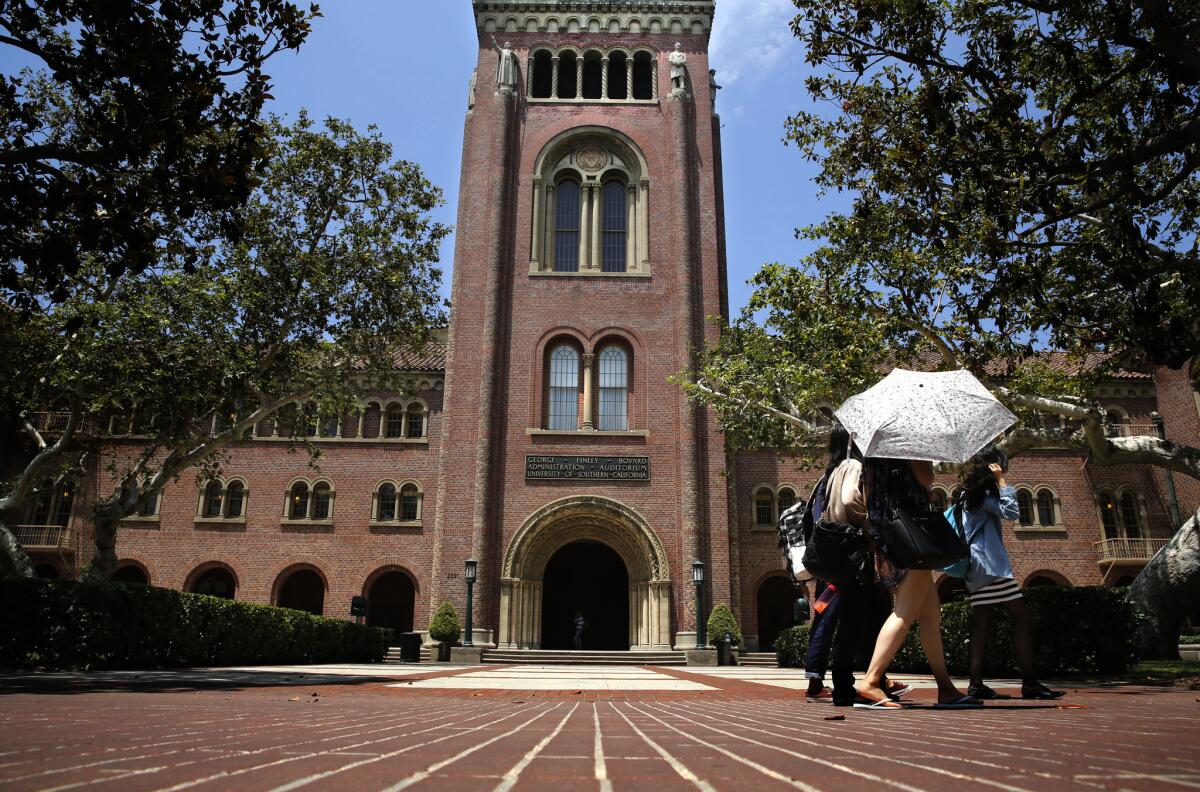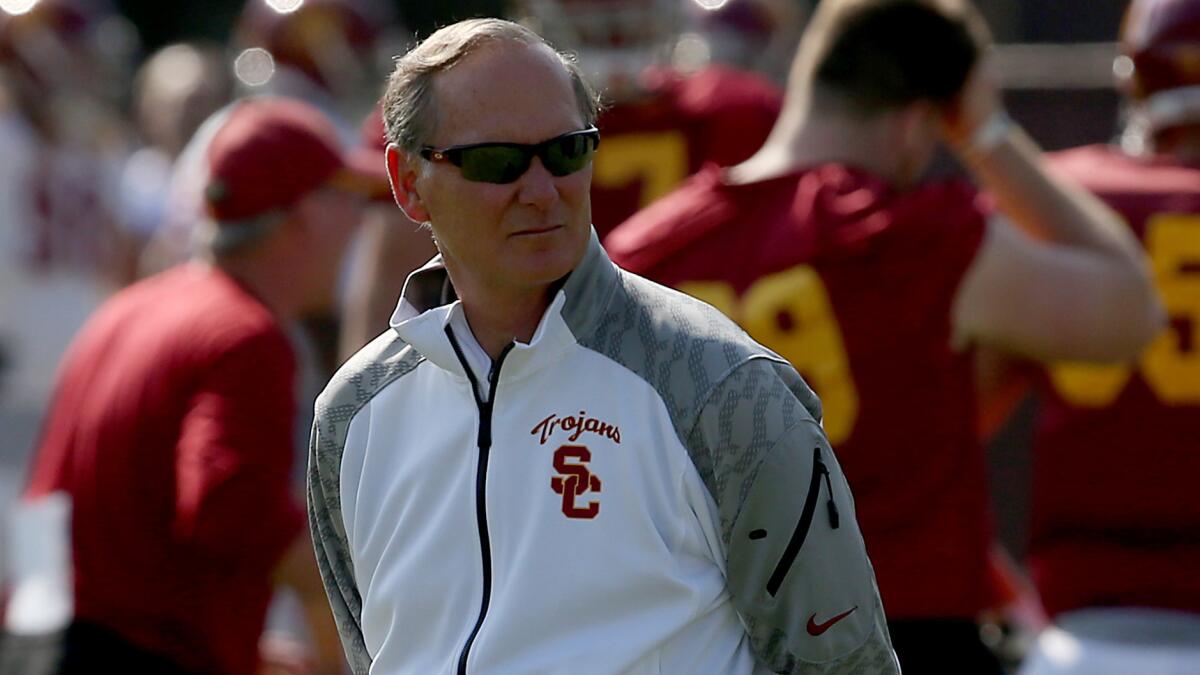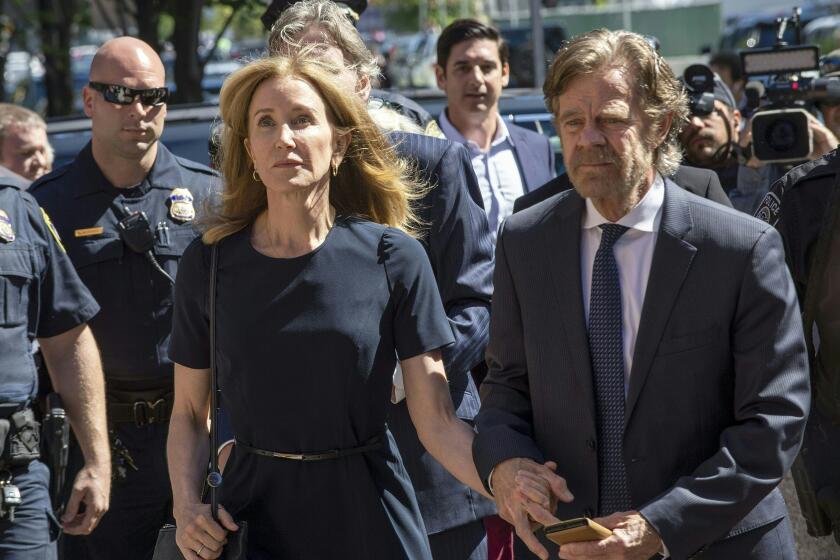How Rick Singer tried to rope in USC legend Pat Haden amid admissions scandal
- Share via
William “Rick” Singer was already deep into running a college admissions scam at USC when he tried to smooth talk the university’s athletic director, Pat Haden, over coffee at the Los Angeles Country Club.
Working under Haden’s nose, Singer had been bribing USC coaches and one of Haden’s top administrators for coveted admission slots that he sold to his wealthy clients, according to federal prosecutors.
But Singer had never met Haden, a legendary figure at USC who wielded enormous influence as the head of its vaunted sports program. A word from Haden could help a kid get in to USC, and that kind of pull, for Singer, was gold.
So, in May 2015, Singer leaned on an old client who knew Haden to make an introduction.
Haden, it turned out, had a different agenda.
USC is now at the center of the sprawling college admissions scandal, in which actresses, tech figures and corporate power brokers were accused of hiring Singer to bribe and cheat their children into elite colleges. While Singer had toeholds on numerous campuses, USC stands out: Four members of the school’s athletic department and 19 parents of USC students were charged in the case.
Federal prosecutors accused top CEOs, two Hollywood actresses and others of taking part in an audacious scheme to get their children into elite universities through fraud, bribes and lies.
Singer’s courtship of Haden, pieced together through interviews and emails reviewed by The Times, offers a rare window into how Singer attempted to make inroads deep into USC’s senior leadership in apparent hopes of furthering his scheme to get the children of the wealthy into top colleges.
It also shows how Haden saw Singer as an unwitting conduit to one of Los Angeles’ richest men, underscoring the relentless focus on fund-raising so prevalent throughout the university.
Haden has remained silent about the scandal, except for a brief statement he issued last month. In it, he said only that he had met Singer once and denied knowing anything about the man’s illegal dealings.
Haden, 66, declined to comment for this story. A source close to Haden, who requested anonymity, said Haden has no recollection of meeting Singer at the country club or a subsequent meeting because they were brief encounters among thousands of meetings and events Haden attended during his time as USC’s athletic director.
Singer, who has pleaded guilty in the federal case and is awaiting sentencing, declined to comment through his attorney.
::
The invitation got right to the point.
“I would like to introduce you to my friend Rick Singer. He has asked to meet you both,” Chuck Kenworthy emailed to Haden and John McKay, a close friend of Haden’s and one of his associate athletic directors at USC.

Kenworthy and McKay had been friends for years from their time working together at a law firm. The friendship continued when Kenworthy left to go to work for Patrick Soon-Shiong, the doctor and entrepreneur who purchased The Times last year. And through McKay, Kenworthy and Haden struck up a friendship. The three are members at the exclusive Los Angeles Country Club.
Kenworthy, who works closely with Soon-Shiong running the investment arm in his network of companies, touted Singer in the email to Haden and McKay as “one of the top college counselors and a great guy.” And he vouched for him personally, saying that he had known Singer for about five years and received “great advice” from him when he hired Singer to help one of his daughters navigate the college application process.
Apart from his criminal operation, Singer provided legitimate college admission services to families. In an interview, Kenworthy said the work Singer did with his daughter was above board, and The Times found no evidence to indicate otherwise.
When Singer called to ask his help getting a meeting with Haden, Kenworthy said he didn’t hesitate because his own experience with Singer had been positive and countless friends whom Kenworthy trusted also spoke highly of him.
“I only ever saw the legitimate side of him,” Kenworthy said. “He used me to get to my friends. That is embarrassing and it makes me really angry. He knew exactly what he was doing.”
Singer told Kenworthy he wanted to meet Haden in order to show him what a great asset he was to USC — someone who steered athletes and academically gifted students from wealthy families to the school, and could continue to do so in even larger numbers.

“He told me, ‘I want to talk to Pat about all the great things I am doing for USC.’ I think he wanted to be seen by Pat as someone who could make the school even better,” Kenworthy said.
To underscore the point, Singer gave Kenworthy a list of high-profile families with ties to USC who had hired him and told him to include the names in his email to Haden and McKay.
Kenworthy obliged, dropping the name of an A-list actor, a few prominent Bay Area figures, an L.A. real estate mogul, and the other high-profile families Singer provided.
“Am aware you know many of these families,” Kenworthy wrote. “And for many yrs to come, Rick will continue to counsel and direct many high school kids to USC.”
The email, which Kenworthy sent on a Monday night in late May 2015, got Haden’s attention. Less than 20 minutes later, he sent a message to his assistant and copied Kenworthy.
“Please arrange,” he instructed. “Thx Chuck!”
::
Haden had been expecting the request.
Before sending the email, Kenworthy had reached out to McKay to lay the groundwork for a meeting between Singer and Haden, said Kenworthy and McKay in separate interviews.
McKay knew Haden was inundated with requests like this from people who wanted a favor of some sort. Had it been anyone else asking, McKay said he would have spared his boss and friend the inconvenience by declining the offer.
But this was Chuck Kenworthy, a close advisor to Soon-Shiong, whose fortune is publicly estimated to be about $7 billion.
Along with wanting to do a favor for a close friend, McKay knew Kenworthy could be helpful to Haden.
Being athletic director meant building relationships with wealthy people who might donate to USC and, according to McKay, Haden had been trying for some time to make inroads to Soon-Shiong.
Haden was particularly eager to have a line to Soon-Shiong as Haden was trying to sell 24 luxury suites that were being built as part a major renovation of the Coliseum, USC’s famed sports stadium, according to McKay and emails reviewed by The Times. Twenty-year leases for the suites were selling for between $7.5 million and $10 million, and Soon-Shiong was on Haden’s list of possible buyers.

If meeting with a college admissions counselor would help open a door to Soon-Shiong, McKay reasoned it was time well spent for his boss.
“I figured we should take the meeting, one as a favor to a friend, but also because, if you’re in the world of developing business relationships, then having a relationship with Patrick Soon-Shiong is not a bad idea,” McKay said. “Who the meeting was with didn’t matter much to us.”
The men agreed to meet over lunch at the country club on June 11, emails reviewed by The Times show. Lunch later was switched to breakfast because Haden had a scheduling conflict and then ended up becoming a conversation over coffee, according to the emails and McKay.
It was a brief meeting — no more than 10 minutes, Kenworthy recalled. Both Kenworthy and McKay said Singer did nearly all of the talking, going on at length about his prowess as a college admissions counselor, his connections at USC and other universities, and how he worked almost exclusively with wealthy families.
Haden and McKay listened politely before McKay announced they had to leave for another appointment, Kenworthy said. McKay recalled being taken aback by what “a self-promoter” Singer had seemed to be and how unabashed he was about the wealth of his clients. In retrospect, McKay said he now believes Singer was trying to convey that he could deliver parents to USC who would make sizable donations.
“That was of zero interest to us,” McKay said, adding that Haden and the dozen or so development officers who worked for the athletic department had no trouble raising money from donors. “We didn’t need Rick Singer. In a million years, no way we have taken that meeting if it wasn’t for Chuck Kenworthy and Patrick Soon-Shiong.”
Haden, nonetheless, expressed enthusiasm in an email to Kenworthy after the meeting. “Chuck, WOW!! Thanks for the introduction to Rick. Fascinating guy. I really look forward to seeing him again soon. Thx!!!”
The source close to Haden said it was Haden’s nature to be overly polite to people introduced to him by friends. His enthusiasm here was amplified because Singer was an acquaintance of Kenworthy.
The next week, Haden reached out to Kenworthy, thanking him again for the introduction to Singer and letting him know the two were planning to meet again in a few weeks.
Then, he pivoted.
“I would like to present to you regarding our Coliseum renovation and, in particular, our Founders suite/club for you/Patrick or for one or more of your companies to consider,” Haden wrote. “I am pretty excited about the product…long overdue at the Coliseum and I am receiving some positive feedback from my early sale process. Sold nine so far...We’ll have some very interesting people in the 24 suites.”
Haden had talked about the suites before, but this was his formal pitch.
Haden gave a quick overview of the prices involved and signed off saying, “Let’s get together and let me show you our plans. Thanks!”
Kenworthy responded later the same day. He once again sang Singer’s praises, writing, “I know Rick will deliver — he’s a stand-up, wonderfully connected guy.” And as for Haden’s pitch on the Coliseum, he showed himself willing to help. “Do you have any materials I could show Patrick?” he asked.
::
Singer made his move at his second meeting with Haden.
On July 2, the men met in Haden’s office, emails reviewed by The Times show. An email Singer sent the next morning suggests he had used the meeting as an opportunity to hit up the athletic director for help getting the daughter of a client from Texas into USC.

“Pat thank you very much for the special time you spent with me yesterday. You are doing an amazing job at USC,” began Singer, before switching gears. He told Haden he was waiting for the mother to send him the girl’s transcript and admission test scores and that he would send them along. A few minutes later, Singer sent the girl’s information, the emails show. The name of the family was redacted in the emails reviewed by The Times.
The girl had already been denied admission and unsuccessfully appealed the decision, emails show. Now, just two months before the start of the school year, Singer wanted Haden to find a way to get her in.
Early in the morning on July 4, Haden forwarded Singer’s email on to Donna Heinel, his associate athletic director who handled most admission issues for the athletic department, and asked if she had any ideas on whether the department could be helpful.
In her response a few hours later, Heinel ignored Haden’s inquiry about the girl. She was focused instead on Singer. She wanted to know whether Singer was “in good graces” with the university’s president and if he was seen “as an asset to the university?”
“I have no idea,” Haden replied. “Do you know him?”
Prosecutors in the college admissions case have charged Heinel with crimes they say she committed while working closely with Singer on his scam. She has pleaded not guilty to allegations she took payments from Singer in exchange for helping to sneak his client’s kids into USC by falsifying records that portrayed the students as talented athletes deserving of spots the school reserves for the athletic department.
Months before Haden asked Heinel if she knew Singer, she was involved in efforts to get the son of a Singer client into USC as a football player, court records filed by prosecutors show. In a February email to a coach who is also accused of conspiring with Singer, for example, Heinel made handwritten edits to the sports resume the coach had fabricated for the teen and suggested a fake photo that purported to show the boy playing football be swapped out for a “better picture” that was “more athletic,” prosecutors wrote in the filing. Heinel later recommended to an admissions committee that the student be admitted as a football player, according to the court filings.
The boy’s father, who is also charged in the case, later paid $75,000 to a USC account Heinel controlled and paid Singer another $250,000, prosecutors allege.
Heinel said none of this to Haden. Instead, she responded to his question vaguely, saying she thought she remembered Singer as being “a guy that counseled a person” on getting into USC as an athlete. “Not sure though,” she wrote. The copy of Heinel’s email reviewed by The Times was partly redacted.
Nina Marino, an attorney for Heinel, disputed the government’s account, saying that her client did not know Singer at the time and was unaware of his dealings with the USC coach.
Heinel, Marino added, did not meet Singer until Haden introduced him to her at a meeting in Haden’s office in July, 2015. Marino did not specify the exact date of the meeting.
Haden, for his part, expressed concerns about Singer. He wrote to Heinel that he “had a red flag up” about the college counselor. “I am being careful with him.”
Some of Singer’s clients, Haden told Heinel, were kids “we are working with.” McKay said Haden was probably referring to donors or other families who commonly asked Haden for help getting a relative or friend into USC.
The requests were handled on a case-by-case basis, and Haden would sometimes write letters of support but had no say in admission decisions, McKay said. McKay added that Haden, who was appointed athletic director in 2010 and left USC in 2017, admonished his staff frequently against quid pro quos and barred any donations until after a family learned whether or not their child was admitted.
Haden asked Heinel to look into Singer.
“Do some homework,” he wrote.
::
After making his pitch to Kenworthy on the Coliseum suites, Haden had the informational materials Kenworthy requested sent out to him. Kenworthy said he took the idea to Soon-Shiong, who in the end did not buy a suite.
Singer, meanwhile, checked in to see if Haden would be able to help with the girl from Texas. Haden replied, “Rick, I am told it is too late to make something happen. Sorry.”
Undeterred, Singer made another request the next day, asking Haden if he would meet with a father and son, who wanted to attend USC, when they were in Los Angeles the next month. The parents, Singer boasted, had already given $100,000 to USC and were “incredibly successful folks in the technology space in the Bay Area.” The name of the family was redacted in the copy of the email reviewed by The Times.
Haden seemed decidedly cooler with Singer than before. He did not respond for two weeks and, when Singer asked again, Haden said only that he was “checking my travel plans.”
Singer persisted a few weeks later, but Haden said he could not meet because of jury duty. He did not respond to Singer’s request for some other dates that would work.
Singer resurfaced two months later, to ask Haden once again if he would meet the family.
It was textbook Singer: He urged Haden to make time for the family, telling him that they were well connected with other influential people at USC and a “strong investor” in a professional basketball team.
“Could you please provide dates for potential meeting?” Singer asked.
The email was met with silence.
More to Read
Sign up for Essential California
The most important California stories and recommendations in your inbox every morning.
You may occasionally receive promotional content from the Los Angeles Times.












